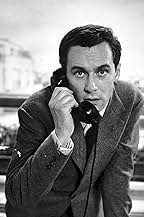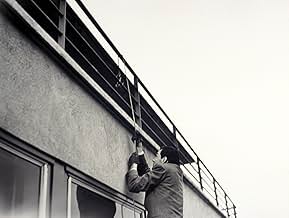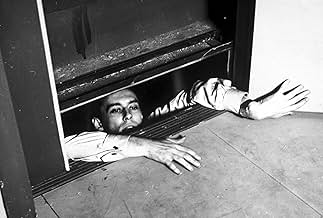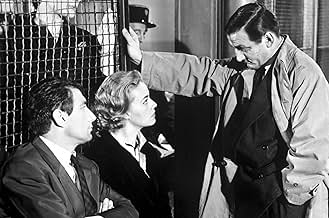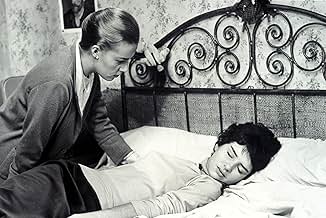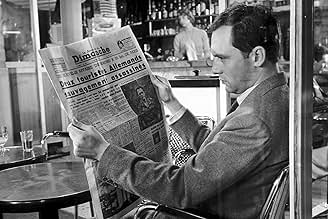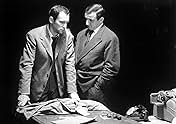Ascenseur pour l'échafaud
- 1958
- Tous publics
- 1h 31min
NOTE IMDb
7,9/10
31 k
MA NOTE
Un homme d'affaires sûr de lui assassine son employeur, le mari de sa maîtresse, et déclenche involontairement une chaîne d'événements malheureux.Un homme d'affaires sûr de lui assassine son employeur, le mari de sa maîtresse, et déclenche involontairement une chaîne d'événements malheureux.Un homme d'affaires sûr de lui assassine son employeur, le mari de sa maîtresse, et déclenche involontairement une chaîne d'événements malheureux.
- Réalisation
- Scénario
- Casting principal
- Récompenses
- 1 victoire au total
Avis à la une
Elevator to the Gallows is a great film and even better, has a short running time! The acting is great in every instance, the plot is original, and the direction is probably among the best I've ever seen. I loved how the plot had a lot of twists but there weren't so many that you were confused as to what was going on. Although I won't reveal the ending, I thought it was great and made me smile. However, you have to like this type of movie to see it, as it is kind of complicated and there isn't a ton of action. This film shows how the perfect murder can be only planned so well; you can never plan what could happen. If you don't get bored too easily, stick with this gem and I'm sure you'll love it.
10jbinfo
This film is a master piece. Miles Davis's music is superb. It is an object lesson on the art of combining sound and vision. The tension and the brooding Parisian atmosphere are heightened with cool and poignant playing. It is surprising (to the best of my knowledge) that this is the only complete original film score he produced.
The story of the crime is clever. It has reasonable human motivation and plot, and is steadily revealed. But, it is the study of 'being in the wrong place at the wrong time' that makes this film a classic. The series of chance events that will dramatically effect the characters' lives, give this film a similar feel to 'Run Lola Run' or 'Irreversible', dispute this film's linear structure and age. The dark cinematography is excellent.
I have only had an opportunity to see it once (I only just caught it because BBC4 listed it under its English title), but I would like to see it again.
The soundtrack is widely available, but I can not find the film on DVD or PAL VHS. This film should be available to a wider audience, for me, preferably in French with English subtitles.
P.S. This wonderful film is now available on DVD as part of the Louis Malle Collection: Volume 1. (Updated 11/10/2006.)
The story of the crime is clever. It has reasonable human motivation and plot, and is steadily revealed. But, it is the study of 'being in the wrong place at the wrong time' that makes this film a classic. The series of chance events that will dramatically effect the characters' lives, give this film a similar feel to 'Run Lola Run' or 'Irreversible', dispute this film's linear structure and age. The dark cinematography is excellent.
I have only had an opportunity to see it once (I only just caught it because BBC4 listed it under its English title), but I would like to see it again.
The soundtrack is widely available, but I can not find the film on DVD or PAL VHS. This film should be available to a wider audience, for me, preferably in French with English subtitles.
P.S. This wonderful film is now available on DVD as part of the Louis Malle Collection: Volume 1. (Updated 11/10/2006.)
No need to recap the plot. The movie really represents a triumph of form over content. Seldom have I seen a smoother technique than director Malle shows here. The transition from scene to scene is almost seamless and keeps the viewer engaged regardless what's developing plot-wise. Then too, Decae's camera work shows how compelling natural lighting can be. The overall effect is one of effortless fluidity, a style well suited to lyrical subjects.
The trouble is the material itself is better suited to Hollywood B-movie techniques. In short, the material is jagged, while Malle's style is smooth, resulting unfortunately in a thriller drained of inherent drama. Note, for example, the elevator sequence, a predicament fairly bursting with suspenseful potential. Yet Malle's style does little to heighten the implicit desperation and even cuts away (though smoothly) from the mounting tension. To be fair, Ronet (Tavernier) adds nothing by remaining impassive throughout. (Perhaps paratroopers never sweat.) Thus the movie's dramatic centerpiece flattens out into just one more event among many.
Then there are the various misadventures of the free-spirited kids. They look cuddly, but remain amoral cyphers throughout, their double homicide coming across again as just one more event, no more important than Florence's (Moreau) dispirited walk up the avenue. In fact, the one time Malle highlights with his camera is that lengthy trudge through Paris, a director clearly fascinated by Moreau's distinctive appearance. Again, the style is smooth and polished, but also highly impersonal and homogenizing. I kept wishing one of Hollywood's noir masters like Nicholas Ray or Billy Wilder had gotten hold of the material first.
No need to go on apart from Malle about a sloppy script with its number of plot holes helpfully cited by other reviewers, or about overlooked details like a bullet to the head that raises no blood. All in all, I wonder how many folks would celebrate the film if it were not from France with Malle's name on it. Apart from its influence on French cinema, the movie does not wear well over time. Moreover, given the style he shows here, it's no surprise to me that Malle's breakthrough movie would be titled The Lovers rather than this over-civilized slice of thick ear.
The trouble is the material itself is better suited to Hollywood B-movie techniques. In short, the material is jagged, while Malle's style is smooth, resulting unfortunately in a thriller drained of inherent drama. Note, for example, the elevator sequence, a predicament fairly bursting with suspenseful potential. Yet Malle's style does little to heighten the implicit desperation and even cuts away (though smoothly) from the mounting tension. To be fair, Ronet (Tavernier) adds nothing by remaining impassive throughout. (Perhaps paratroopers never sweat.) Thus the movie's dramatic centerpiece flattens out into just one more event among many.
Then there are the various misadventures of the free-spirited kids. They look cuddly, but remain amoral cyphers throughout, their double homicide coming across again as just one more event, no more important than Florence's (Moreau) dispirited walk up the avenue. In fact, the one time Malle highlights with his camera is that lengthy trudge through Paris, a director clearly fascinated by Moreau's distinctive appearance. Again, the style is smooth and polished, but also highly impersonal and homogenizing. I kept wishing one of Hollywood's noir masters like Nicholas Ray or Billy Wilder had gotten hold of the material first.
No need to go on apart from Malle about a sloppy script with its number of plot holes helpfully cited by other reviewers, or about overlooked details like a bullet to the head that raises no blood. All in all, I wonder how many folks would celebrate the film if it were not from France with Malle's name on it. Apart from its influence on French cinema, the movie does not wear well over time. Moreover, given the style he shows here, it's no surprise to me that Malle's breakthrough movie would be titled The Lovers rather than this over-civilized slice of thick ear.
ELEVATOR TO THE GALLOWS starts out as a quirky sort of crime film. Florence (the amazing Jeanne Moreau) has convinced her lover, Julien (Maurice Ronet), to kill her husband. All goes well, until Julien realizes he's made a glaring mistake, leading to his getting stuck in the titular lift.
What began as a fairly ordinary murder, soon devolves into a cascade of ironic madness. The genius of this film lies in its subtle, increasingly dark, interconnected situations. Characters are introduced who get involved, making things far worse for everyone. As we watch it unfold, we try to figure out how it will end, only to be stuck and rolled up in the sticky web that Director Louis Malle has spun.
Mr. Ronet plays Julien with a cool dissociation. Ms. Moreau's Florence strolls through the entire movie like a morose, drifting spirit. Her inner monologue makes up the bulk of her lines.
The French filmmakers of the late 1950s were ahead of their time, and this movie is a great example of this...
What began as a fairly ordinary murder, soon devolves into a cascade of ironic madness. The genius of this film lies in its subtle, increasingly dark, interconnected situations. Characters are introduced who get involved, making things far worse for everyone. As we watch it unfold, we try to figure out how it will end, only to be stuck and rolled up in the sticky web that Director Louis Malle has spun.
Mr. Ronet plays Julien with a cool dissociation. Ms. Moreau's Florence strolls through the entire movie like a morose, drifting spirit. Her inner monologue makes up the bulk of her lines.
The French filmmakers of the late 1950s were ahead of their time, and this movie is a great example of this...
The best laid plans seldom consider the unexpected, with the most subtle of causes, the opportunities taken, resulting in profoundly unfortunate effects. An elegantly structured piece of story telling with sound, pictures and performances raised to the rafters, this is a piece of cinema you will struggle to shear away from and, with luck, it wont leave you hanging.
Le saviez-vous
- AnecdotesMiles Davis recorded the music in a single recording session while he watched a screening. He composed it while watching a rough cut and then invited a quartet of French and US musicians in a for few hours (from 11pm to 5am one night), improvising each number and allegedly sipping champagne with Jeanne Moreau and Louis Malle.
- GaffesWhen Florence arrives at the motel, the photos are just being developed - with the lights on! Exposing the prints to light before fixation would make them turn black. By the way, it's not recommended to put your hands into developer.
- Citations
Julien Tavernier: Don't sneer at war. It's your bread and butter. Indochina netted you how much? And now Algeria. Have some respect for war. It's your family heirloom.
- Bandes originalesAscenseur Pour L'Échafaud (Générique)
Composed by Miles Davis
Performed by Miles Davis (Trumpet), Barney Wilen (Tenor Saxophone), Emilhenco (as René Urtreger) (Piano), Pierre Michelot (Bass) and Kenny Clarke (Drums)
Meilleurs choix
Connectez-vous pour évaluer et suivre la liste de favoris afin de recevoir des recommandations personnalisées
- How long is Elevator to the Gallows?Alimenté par Alexa
Détails
- Date de sortie
- Pays d’origine
- Sites officiels
- Langues
- Aussi connu sous le nom de
- Elevator to the Gallows
- Lieux de tournage
- 26 Rue de Courcelles, Paris 8, Paris, France(Tavernier climbing on the upper terrace)
- Société de production
- Voir plus de crédits d'entreprise sur IMDbPro
Box-office
- Montant brut aux États-Unis et au Canada
- 374 671 $US
- Week-end de sortie aux États-Unis et au Canada
- 7 354 $US
- 26 juin 2005
- Montant brut mondial
- 431 784 $US
- Durée
- 1h 31min(91 min)
- Couleur
- Rapport de forme
- 1.66 : 1
Contribuer à cette page
Suggérer une modification ou ajouter du contenu manquant


